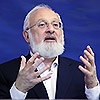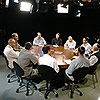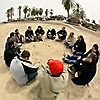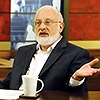Audio Version Of The Blog – 10/17/21
Listen to an Audio Version of the Blog
Download:MP3 Audio

Listen to an Audio Version of the Blog
Download:MP3 Audio
 In order for a prayer to awaken the upper force to answer, it must resemble the upper force to some extent. That is, it should be on the same wave-length, the same frequency as the upper force.
In order for a prayer to awaken the upper force to answer, it must resemble the upper force to some extent. That is, it should be on the same wave-length, the same frequency as the upper force.
The upper force works for bestowal, which means that our prayer must be close to bestowal to some extent. At least a little bit! And then, to this extent, we obligate the Creator, the upper force, to hear this request and to respond.
[288582]
From the 1st part of the Daily Kabbalah Lesson 10/15/21, Shamati #20 “Lishma (For Her Sake)”
Related Material:
What Is Prayer?
A Prayer For Society
Write A Prayer
 We are trying to get closer and closer to our friends because we understand that if we do not achieve connection, we will not feel anything but this world. We will not escape from the individual perception of reality in which we feel nothing but ourselves.
We are trying to get closer and closer to our friends because we understand that if we do not achieve connection, we will not feel anything but this world. We will not escape from the individual perception of reality in which we feel nothing but ourselves.
Instead of the true reality, a person feels, sees, and understands only what is inside him, inside his desire to receive. And this is a picture of this world that is deceptive and opposite of the true reality.
Therefore, we need to understand three things. The first is that without connection between us, we will not be able to feel the upper world. The second is that we will never be able to achieve this connection. And the third is that it is possible only with the help of the upper force, the force of bestowal and unity. To the extent that the upper one gives us His power, we will advance to a connection within which we can feel the spiritual world and the Creator.
And the fact that we do not want to get closer is given to us to help us begin to understand what we lack and what hinders us. And then, in order to reverse this resistance into connection and turn it into its opposite—approaching spirituality—we need prayer.
We need a request to the Creator to turn the force of our egoism, rejection, hatred, passion, pride, ambition, all our aspirations to distance ourselves from others, into its opposite, into connection. The Creator is able to do it! We only need to ask.
[288588]
From the 1st part of the Daily Kabbalah Lesson 10/15/21, Shamati #20 “Lishma (For Her Sake)”
Related Material:
Whom To Ask For?
To Ask The Creator
What To Ask The Creator
 A plane has this device called a gyrocompass. It is built upon a constantly rotating gyroscope, it points to the North Pole, and helps aircraft navigate.
A plane has this device called a gyrocompass. It is built upon a constantly rotating gyroscope, it points to the North Pole, and helps aircraft navigate.
For us, the group serves as such a gyrocompass. Other than that, we have no way to navigate. It is like being in a tiny boat in the middle of the ocean and not knowing where to go. The only compass for us is our egoism.
But if we want to aim in the right direction, then we have no compass or gyroscope for that. We have a common boat in which the group is. And because of the fact that we unite with each other despite the resistance of our egoism, we thereby direct ourselves to the Creator whom we do not see and do not feel.
We can keep the direction toward Him only by trying to connect above our egoism. This is the point where we join together, it is that very North Pole, the guiding star. And so we move forward.
Without the group, you will not be able to find your direction among all the forces of nature surrounding you. Therefore, it is said: “Either the group or death.”
If I want to be in the center of the group all the time, where all its desires, intentions, and spiritual goals are focused, then I am correctly directed at the Creator. I have to stick to this center until I discover the upper force in it.
[288595]
From the 1st part of the Daily Kabbalah Lesson 10/15/21, Shamati #20 “Lishma (For Her Sake)”
Related Material:
The Purpose Of Creating A Group
Where Is The “Group Of Abraham” Today?
When You Start Looking For A Group
My new article on Linkedin “The Forecast for the Young – Severe Weather and Anxiety”
An extensive study among young people ages 16-25 has revealed that they are anxious about the future, and with good reason. The research, whose authors claim to be “the largest and most international survey of climate anxiety in young people to date … shows that the psychological (emotional, cognitive, social, and functional) burdens of climate change are profoundly affecting huge numbers of young people around the world. Furthermore, it is the first study to offer insight into how young people’s perception of governments’ responses to climate change is associated with their own emotional and psychological reactions.”
Under the section “Implications of all the available evidence,” the authors write: “Distress about climate change is associated with young people perceiving that they have no future, that humanity is doomed, that governments are failing to respond adequately, and with feelings of betrayal and abandonment by governments and adults. These are chronic stressors which will have significant, long-lasting and incremental negative implications on the mental health of children and young people. The failure of governments to adequately address climate change and the impact on younger generations potentially constitutes moral injury. Nations must respond to protect the mental health of children and young people by engaging in ethical, collective, policy-based action against climate change.”
I admire the proactive approach, but if it stays on the level of suppressing operations that are perceived as harmful to the climate, nothing will change. The climate will not improve and young people’s anxiety will find no relief. Dealing with each problem separately is like trying to stop an overflowing sewer system by sealing each manhole cover separately instead of shutting the valve that’s causing the flood. Likewise, to solve the climate crisis, we must get to its origin and fix what is broken there.
The climate is not a separate system; it is part of the global ecosystem where we live. The system is built as a pyramid of levels that function harmoniously and in an interdependent manner. If the harmony is obstructed on one level, all the levels below it will be adversely affected. At the top of the pyramid is man, of course. Therefore, every obstruction in human society affects the entire pyramid, the entire ecosystem, or simply put: the whole world.
While the human level has never been harmonious, for the past several decades, it has been utterly dysfunctional. Worse yet, it is growing more so by the hour. It is no wonder that young people have no faith in older generations; they see the kind of world we have left for them, and they are not happy about it. If we want to help them, the least we can do is point to the real problem: human society.
All the negative phenomena, on every level, are offshoots of our dysfunctional relations in society. Storms, fires, earthquakes and volcanic eruptions, rogue viruses, dying bees, and of course hunger and war, are all projections of our disharmonious relations that trickle down the pyramid and poison every level.
Therefore, if we want to change the world, we must change our society. Moreover, we must encourage the younger generation to lead the process, since in the end, they are the ones who will be here tomorrow.
If we build a society that favors unity and solidarity over individuality and competition, we will radiate that positive mindset throughout the system, just as we are currently projecting the opposite. Instead of ruining nature, we must learn from its example, see how it functions through connection and collaboration, and build our society likewise.
We needn’t fix anything other than our own broken, hate-filled relations, since nothing else is broken. When we become harmonious with one another, we will start projecting harmony down the entire system, and everything will calm.
[288585]
My new article on Linkedin “What Can We Learn on World Teachers’ Day?”
This month, on October 5, to be exact, is World Teachers’ Day. A teacher used to be, and in some countries still is, a venerable occupation. A teacher was not simply someone who taught you math or English, but someone who taught you the wisdom of life and was a role model to follow. Judging by what is happening today, it seems we are in desperate need of good teachers. For all our knowledge, we feel lost. Unless we learn where we really are, what we are doing here, why we are here, and how to direct ourselves toward a better place, we will lapse into another world war.
To emerge from the slump, we must stop focusing solely on knowledge. Acquiring information does not create happy people. Where has the information about nuclear fusion gotten us, for example? We’ve got nuclear weapons that can annihilate humanity in minutes. We’ve got so much knowledge in every realm of life, but where is it all leading? We’re heading toward dire states.
Instead of teaching us what they should, our poor teachers regurgitate what the government instructs them to teach. They are forced to lie to the students, but the students know better. By age 9 or 10, most children know that none of what they are hearing is true. They stop believing their teachers, stop paying attention, while the teachers, who must make a living, keep repeating the same stories. There are no other motivations here but money and power; these are the rulers of the Earth, and no regime or government is free from their grip.
A change will come only when we realize that this is not the way to live, and resolve to change our motivation. But the change will happen either because we reflect on where we are going and stop ourselves before we get there, or because we did not stop ourselves in time and realize our mistake after the bombs have gone off.
To make the necessary changes in time, we cannot leave it only to teachers and excuse ourselves from the task. We have to reconstruct the entire system, the basis of our civilization. The fact that we are self-absorbed and narcissistic is no secret. But this is not the problem. The problem is that we agree to stay this way. We’ve known for decades that humanity is on a path of self-destruction due to its own self-absorption. Yet, we have done nothing to change course.
Now we must become our own teachers, and not just on World Teachers’ Day, but every day and every moment of our lives. Moreover, the world we live in has become so intertwined that it is not enough to implement the changes one country at a time. While some countries engage in reforms, others will maintain their abusive attitude and will ruin the progress for everyone. Therefore, the initiative to create a positive tomorrow must incorporate the entire world. However implausible this may sound, we must remember that the only other option to this route is war, a nuclear war.
Accordingly, the education system must adjust its values, curricula, and goals toward bettering humanity. By bettering, I am not referring to cutting CO2 emissions or limiting the use of fossil fuels and plastics. I am referring to something much deeper than that: Bettering ourselves means making ourselves better people. To do that, we must learn to be positive and caring toward each other.
Only when we learn to care for one another will we begin to care for the environment. When we care about other people, we will want them to live in a friendly environment, one that can support them and where they can be happy. When we stop wanting to exploit other people or overpower them, we will stop exploiting the environment in order to achieve our selfish goals. As a result, we will reduce consumption to a sustainable level that will allow nature to rejuvenate and restore its lost balance.
We have no time to waste. We must be our own teachers now, to teach ourselves to be human, meaning humane. Even if we do not know how to do it or where to begin, we needn’t worry; our intention to do good, to connect with other people, will be our guide. If we let care for others be our teacher, we will need no other teaching.
[288700]
My new article on Linkedin “Cyberattacks Require a New Code”
Over the past week, Hillel Yaffe Medical Center in Hadera, Israel, has suffered a cyberattack. The attackers demanded ransom, but the hospital management refused to cave in and switched to manual mode where possible or to alternative systems. All over Europe and the US, hospitals and other sensitive institutions face online threats since hackers believe that the necessity to restore functionality quickly will cause those facilities to give in quickly and give them what they want. To deal with the problem, facilities and governments must join hands and create short-term and long-term solutions. The short-term one requires disconnection of systems from the internet; the long-term solution requires increased connection and concern among people.
No system is hack-proof. Therefore, some systems simply need to be disconnected from any network. Everything from the generator that provides electricity to the server room must be isolated from the world. It may not be very convenient, but until humanity grows up, we cannot leave the lives of countless people to the mercies of heartless people who will kill for money.
While disconnecting sensitive systems from the internet seems to be the only solution, it is only a temporary one. Since people always devise new tactics and technologies to get their evil way, sooner or later, they will overcome even such drastic measures.
Therefore, the long-term solution must deal with the source of the problem, which is human nature itself. Changing human nature is a prolonged educational process. Disconnection from the internet buys us time, but we must still hurry if we want to avoid far worse catastrophes than breaking into hospital networks.
The purpose of the educational process is to make us aware that we are all interconnected. If we truly realize that all of humanity is connected not only through the internet, but that even our thoughts and feelings are a part of the network, we will see that hurting others hurts us, too, and our motivation to do harm will evaporate.
This process will project positively on all the systems of life, and on all the people; this is why it is such a comprehensive process and requires the support of governments and international organizations. Hacking hospitals, water plants, and other sensitive facilities for ransom is only one symptom of a society that is sickened by alienation. If we cared about each other, we wouldn’t be able to do it.
The human network that we all form, consciously or not, functions properly only if there are care and concern among us. This is why the long-term process will heal everything, and not just eliminate cyberattacks.
To do that, we must “hack” the human code and reprogram ourselves from the self-centered mode we are in right now, to a more inclusive and caring one. Otherwise, as we can already tell, the code within us will cause us to self-destruct.
[288716]
My new article on Linkedin “The Balance a Year After the Abraham Accords”
A bilateral agreement between countries is always better than no agreement. A year since the signing of the US-brokered Abraham Accords for peace and normalization of relations between Israel and Arab states, the question is how have they truly transformed the region and how in particular has Israel benefited from it?
The Israeli parliament, the Knesset, celebrated the first anniversary of the pact with the launching of a new caucus dedicated to the Abraham Accords. The aim was to strengthen the ties between Israel and the Gulf states, Bahrain, Morocco and Sudan, from an economic and tourist perspective. The commemoration was followed by a trilateral meeting in Washington between US, Israeli and Emirati officials.
It is good that the State of Israel, which endures hostile relations and is under constant existential threat from its neighbors, continues to preserve the agreements and its tenets. It also serves as a good yardstick for other countries who contemplate reaching out for peace.
We could have benefited much more from relations with the Arab Gulf states, and with the Middle East in general if only we had been more united and stronger among ourselves. Within Israel there are so many opposing and divided forces, each one disqualifying the other and preventing the other from succeeding, even when it comes to crucial agreements upon which the future of the State of Israel depends.
This is the way of the egoism—benefitting at the expense of others—that acts in us naturally and grows incessantly. Even 3,800 years ago human egoism brought us to a significant division. The inhabitants of the ancient kingdom of Babylon were self-centered and divided, which culminated in the construction of the famous Tower of Babel. This “skyscraper” symbolized the egoistic urge, the pretentious thought of the Babylonians that they had the power to reach up to heaven and control nature, even the supreme force of nature.
Abraham, our father, who recognized the egoism and its tendency to lead to serious trouble, gathered a group of people under his tent and taught them the doctrine of life—the method of connection. From this group of disparate residents of Babylon, the people of Israel were founded as a nation.
Abraham taught anyone who was interested how to reach cordial agreements between them, how to transcend conflicts that separate people, and to connect with love. He explained that from the desire to unite with each other in friendship the positive force that exists in nature arises, a unifying and connecting force. It is this supreme force of nature that elevates human beings above the miserable egoism and binds them together in love.
From the days of Abraham until today, the condition for all peace agreements, with any country, depends on our agreement to make peace between ourselves. If we continue to separate and quarrel amongst ourselves, then those countries that have already signed agreements and captured beautifully as a poster picture may withdraw their signature from the accords.
It is very unfortunate to live in such a time when we had supporters such as former President Trump and were given the opportunity to manage our destiny in a direction that is beneficial to us and all people, but we have disregarded and rejected that opportunity. Who knows when such a chance will return.
It seems to us that we live on the land of Israel by our resilience, intellect and the force of our hands, but the truth is that we exist here by the grace of heaven. Agreements are always preferable to fractious relationships, but first and foremost we must commit and agree among ourselves that despite the separating egoism, we will strive to increase the power of connection between us and be kind to each other. Only in this way the supreme grace will be aroused, and He will make peace among us and with the rest of the world.
 Michael Laitman, On Quora: “What are the biggest challenges facing humanity these days? Why are they a big deal?“
Michael Laitman, On Quora: “What are the biggest challenges facing humanity these days? Why are they a big deal?“
Increasing pain and suffering around the world should end up sparking our realization that nature is guiding us to an eventual abstinence from the rat race for technological, industrial and financial dominance, and we should instead pay attention to our human development, to the education we need to give—not only to children, but to entire nations, to humanity.
International relations have become sour, and the more sour they become, the more they pose a threat. I think that as a result of the increasing pain and suffering in the world, we will start understanding that we have no choice but to start nurturing positive human connections.
Nature will no longer let us progress in divisive directions, but will force us to unite—if not voluntarily then through suffering. Therefore, humanity’s greatest challenge is in uniting above division in order to reach balance with nature. Until we align with nature, the pain and suffering we experience, as bitter as it is, functions to heal us.
Based on talk, “Meet the Press,” between Kabbalist Dr. Michael Laitman and David Rosenthal. Written/edited by students of Kabbalist Dr. Michael Laitman.
 In Contradiction to the Category of Truth
In Contradiction to the Category of Truth
Baal HaSulam “Peace in the World“: One person in the society labors in one hour of work, due to his weakness, much more than another who works two hours or more.
And there is also a psychological matter here, since he who is very lazy by nature exhausts himself in one hour more than his friend in two hours or more. According to the perspective of the evident truth, we should not compel one part of society to labor more than the other part for the satisfaction of the needs of their lives. But in truth, the naturally strong and nimble in society benefit from the labor of others and exploit them maliciously against the attribute of truth, for they labor very little compared to the weak and lazy in society.
The problem is that a strong and clever individual exploits society when he works fewer hours. If he is hardworking and diligent, he does not make deep internal and moral efforts to do the same work as the weak and lazy individual does.
For example, a child comes to school to learn and sits quietly for five hours straight because he finds what the teacher says interesting. Next to him, there is a restless kid who cannot sit still for even ten minutes. He practically explodes and does not know what to do.
How can we expect the same efforts from both of them? They are different by nature. Who is going to measure this? It is like this throughout our life.
Another example is a person who does not forget to buy his wife a bouquet of flowers every week, while another individual’s only desire is to go fishing, but their wives expect the same thing. The fisherman’s wife doesn’t take into account that it will be a great effort for him even if he buys her flowers once a month, while for the other, it is no big deal and he does it automatically.
How can we demand the same thing from both of them if they are different by nature?
[252860]
From KabTV’s “Fundamentals of Kabbalah” 7/28/19
Related Material:
The Four Attributes Of Upper Governance, Part 9
The Four Attributes Of Upper Governance, Part 8
The Four Attributes Of Upper Governance, Part 7